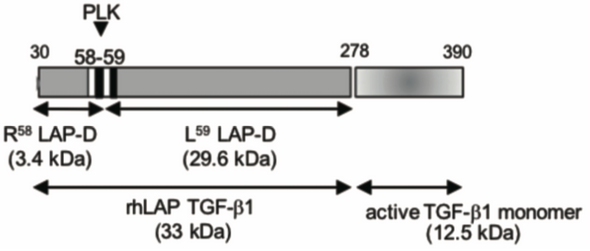Description
Anti-Latency-Associated Peptide (LAP) Plasma Kallikrein Degradation Fragment R58-specific mAb 18F9-16 was cloned from mice immunized with R58 peptide [CGQILSKLR]. 18F9-16 recognizes the C-terminus cut end of LAP degradation product (LAP-D) R58 produced when latent TGF-β is digested with Plasma Kallikrein. 18F9-16 is validated for IHC and IF.
TGF-β is produced as a pro-protein latent complex in which a 25 kDa active TGF-β fragment is trapped by an N-terminal pro-peptide called Latency Associated Protein (LAP). Active TGF-β is released from the latent complex in a process called the TGF-β activation reaction involving a conformational change induced by binding of the latent complex to cell adhesion proteins such as thrombospondin and integrins, and/or by being cleaved by serine proteases, cysteine proteases, and MMPs in an organ and context-depending manner.
Kojima and his colleagues in the Cellular Molecular Pathology Research Unit (currently, Center for Integrative Medical Sciences, Liver Cancer Prevention Research Unit), RIKEN, Japan focused on the role of serine proteases plasmin and plasma kallikrein in the release and activation of TGF-β and its involvement in liver diseases. They showed that plasmin and plasma kallikrein cleave, respectively, at Lys56-Leu57 and Arg58-Leu59 within the LAP portion of the latent TGF-β1 molecule. The anti-TGF-β1 LAP-degradate (LAP-D) antibodies are useful for investigating the molecular mechanism of TGF-β activation and its related diseases, including liver fibrosis/cirrhosis and liver degeneration.
Applications
- Immunohistochemistry (IHC) 10 μg/mL
- Optimal dilutions/concentrations should be determined by the end user.
Specifications
- Host Species mouse
- Form liquid, PBS (pH 7.4), 0.05% NaN3
- Volume 100 μg (1 mg/mL)
- Specificity recognizes C-terminus cut end of LAP degradation product (LAP-D) R58 when latent TGF-β is digested with Plasma Kallikrein (PLK).
- Antigen R58 peptide [CGQILSKLR]
- Clonality monoclonal (clone # 18F9-16)
- Isotype IgG3
- Purification purified by affinity column (Protein A) from serum-free cell culture medium
- Conjugation none
- Storage condition store below -20°C (below -70°C for prolonged storage) Aliquot to avoid freeze/thaw cycles.






